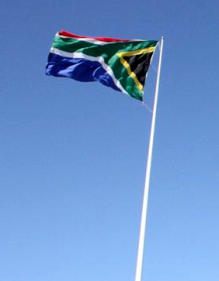
South Africa is in the throes of the most hotly contested election in its short history of democracy. A mere 20 years into its widely applauded transition from apartheid, pervasive corruption is a central campaigning issue.
This is magnified by the burgeoning scandal surrounding the incumbent president and the ruling party’s presidential candidate, Jacob Zuma.
Zuma generated massive public outrage and a slew of litigation for presenting a R250-million (US$25 million) refurbishment of his private family residence as a “security upgrade”. In a scathing report, the public protector, a widely respected ombudsperson, found that the president unduly benefitted from illegally and unethically procured public funds.
This is not an isolated incident of corruption for Zuma, but it serves to highlight how powerful public figures – and their well-connected friends in the private sector – act with brazen impunity.
Unfortunately, it also highlights widespread corruption in South Africa, ranging from the “cooldrinks” euphemistically and regularly demanded by traffic cops, to major public procurement corruption.
A multitude of public surveys and polls show poor service delivery and political corruption – the two are generally linked – are high on the people’s agenda.
Strengthening institutions
South Africa possesses most of the institutional features necessary to combat corruption, notably a much-admired constitution, an independent judiciary and a robust media. But in most indices of corruption, including those produced by Transparency International, South Africa is ranked somewhere in the middle.
The bad news is that its ranking steadily deteriorated for many years and has now stabilised at an unsatisfactory score of 42, indicating a serious problem with corruption, in the 2013 Corruption Perceptions Index. In the 2013 Transparency International Global Corruption Barometer, 54% of the people of South Africa said corruption is getting worse. This is borne out by other surveys.
Two critical and interrelated factors account for the persistent corruption:
- Gross impunity when leading public figures and their private sector counterparts are found to be corrupt;
- Incompetence, resource constraint and corruption in the criminal justice system.
“Dealing with impunity requires effective and independent law enforcement. But perpetrators of corruption can also punished by public outrage and condemnation. There is no doubt that active public scrutiny and oversight is an important instrument for holding political leaders directly to account and for demanding more effective law enforcement,” says David Lewis, head of Corruption Watch, Transparency International’s partner in South Africa.
The new government must address these concerns by demonstrating the will to tackle corruption at the top and by prioritising professional and independent law enforcement.
Transparency International: Corruption Watch
Corruption Watch was set up to encourage and enable the public to participate in fighting corruption and to channel the growing and palpable sense of public outrage.
It is the first civil society organisation in the country to encourage the public to report their experiences of corruption and then to use the data to confront authorities and demand action.
Corruption Watch also investigates selected reports and engages in public interest litigation and policy advocacy. It has mounted targeted campaigns directed at public sector petty bribery on the roads and corruption in schools, as well as public procurement.
In February, Corruption Watch launched a TV ad where its staff played the roles of corrupt officials to show what needs to be done to stop corruption.

